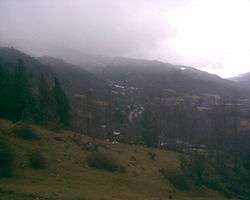Liquiñe
| Liquiñe | |
|---|---|
| Town | |
|
View of Liquiñe from the south | |
 Liquiñe | |
| Coordinates: 39°44′05″S 71°51′15″W / 39.73472°S 71.85417°WCoordinates: 39°44′05″S 71°51′15″W / 39.73472°S 71.85417°W | |
| Country |
|
| Region | Los Ríos |
| Province | Valdivia |
| Municipality | Panguipulli |
| Commune | Panguipulli |
| Government | |
| • Type | Municipal |
| • Alcalde | René Aravena Riffo |
| Elevation | 230 m (750 ft) |
| Population (2002 census ) | |
| • Total | 1,205 |
| Time zone | Chilean Standard (UTC−04:00) |
| • Summer (DST) | Chilean Daylight (UTC−03:00) |
| Area code(s) | Country + town = 56 + 63 |
Liquiñe is a town in Liquiñe Valley, in Panguipulli commune, Valdivia Province, Chile. The area around the village is home to South America's densest collection of hot springs. There are literally hundred of sites where geothermal waters flow up out of the earth. The water emerges from the ground at roughly 176°F (80°C). Therefore, the water must be cooled before being fed into pools for bathing.
The Liquiñe Hot Springs feature geothermally-heated mineral water. Geologically it lies at the north end of the Liquiñe-Ofqui Fault.
The road to Carirriñe Pass goes through Liquiñe, allowing transit to and from Junín de los Andes in Argentina. However, this mountain pass is only open during the summer months of January and February.
See also
External links
This article is issued from Wikipedia - version of the 2/9/2015. The text is available under the Creative Commons Attribution/Share Alike but additional terms may apply for the media files.

